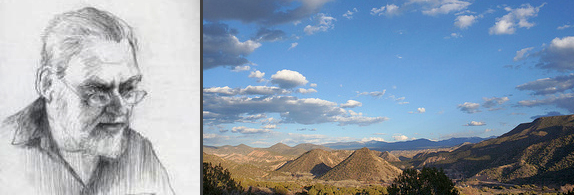Partisan Politics and UNM

In one of the more politically maladroit moves in the University of New Mexico’s murky relationship with state government, UNM’s president Bob Frank last week awarded Governor Susana Martinez a UNM Presidential Award of Distinction, an honor Frank himself invented. Frank appears to be so politically tone deaf that he managed, in one misguided gesture, to put UNM right in the middle of one of the nastiest, loudest and most dissonant political eras anyone can remember in our state. And right before a midterm election.
It’s one of any university president’s primary jobs to neutralize political polarization that might harm their institutions and to keep them safe from partisan morasses like those that currently muck up the well-being of our state and its residents.
But UNM’s President has chosen to do the exact opposite. And put his name on it. His reasons for giving Governor Martinez his award of distinction are just short of flabbergasting.
He awarded her for doing the most popular thing she could have done in the poorest state in the union, and for momentarily not being a very good Republican. Both reasons are head scratchers. In a piece from the UNM Newsroom by Diane Anderson, the school’s Director of Communication, Frank was said to have given the award to Martinez because she “reformed and expanded Medicaid” calling it a “move that bucked the conventional thinking of many in her own political party” and that she “worked with the state legislature to establish a healthcare exchange and dramatically increase the number of health care providers, particularly in rural areas where shortages were pronounced….”
From what I can tell there’s been no dramatic increase in rural health care providers during the Martinez administration. She proposed a $5 million package of incentives for rural docs while the legislature wanted $11 million, a far more realistic number, but still not enough.
Frank makes it sound as if Martinez went to Washington in a suit of armor and reformed and expanded Medicaid all by herself, as if she were some heroic fighter for the people. She just agreed with President Obama’s expansion of Medicaid, an idea that was politically perfect in our state and, as Mother Jones put it, “wildly popular.” She didn’t reform it or expand it. She agreed to the Affordable Care Act’s provisions as they applied to our state. And it hardly seems worthy of note that she “worked with the state legislature” to create insurance exchange pools, again part of the Affordable Care Act and part of her job. She gets an award for doing what she’s supposed to do? It must be such a rare occurrence in her administration that it deserves a medal. Her cabinet secretaries are notorious for refusing even to testify before state senate committees.
What was President Frank thinking of? One political analyst told me with a wink that he must be making a political “investment” based on polls in the mid-term election. But what a sad situation it is.
To the Democratic majority of the state, crossover voters notwithstanding, Frank’s Presidential Award to the Governor will probably be met with outrage and incredulity. Decades of university politics have been spent keeping UNM out of the partisan fray, safe from the worst backstabbing and political movidas. That’s hard to do even when you project a nonpartisan façade, but doubly difficult when you become part of a political camp.
It didn’t serve former basketball coach Steve Alford well either when he stumped for a Republican candidate for Congress, sometime-Sheriff Darrin White, in 2008. Alford took all kinds of heat and never messed with partisan politics again. It was called then a “terrible mistake.” Awarding Governor Martinez a distinguished prize for doing what she was supposed to do is a political faux pas of potentially disastrous unintended consequences.
And now the question becomes has UNM been thoroughly politicized? With President Frank’s relationship with Republican Mayor Richard Berry and the Innovate ABQ project and its Republican Board, and now with his crowning the governor with undeserved glory, has UNM’s boss, and the place itself, become a Republican team player? Has he joined UNM up with a traditionally anti-intellectual political party that thinks American universities are bastions of liberal heresies? It sure seems that way.
And what will a Republican UNM do to the UNM Foundation’s fund-raising efforts? What respectable development officer would try to soft sell and mollify the President’s political alignments with potential donors of a different political persuasion, people who are embroiled in a polarized partisan war who think Republicans are to blame?
There are many hundreds of thousands of such people, many quite well off. They find the governor objectionable, if not to say odious, for a laundry list of political sins, from running an opaque anti-transparent government by private email, to supplying Albuquerque with a stonewalling former cabinet member as the chief of police, to destroying the locally and honorably run behavioral health services system and replacing it with Arizona companies that are inept at best thereby disrupting the psychotherapeutic relationships of many hundreds of mentally ill New Mexicans, to suspected shady dealings at the State Fair racino, to cutting back on the food stamp program, undermining teen pregnancy programs, and her Secretary of Human Services declaring there’s no child hunger in New Mexico when national statistics show New Mexico is number one in child hunger with 1 out of 3 children suffering food insecurity, and her Secretary of Education being so controversial as to never achieve senate confirmation. That’s just at the top of the list.
Poor UNM tossed into the political lion’s den by its own president. Probably half the school’s alumni are muttering under their breaths about a right-wing take over at their alma mater and rethinking those end-of-year checks they were about to write to support their school.
Voting and Human Fallibility

Why would a rational person vote for a member of a political party which believes in the infallibility of the marketplace guided by the “invisible hand” of self-interest that moves in mysterious but ever perfect ways?
Isn’t fallibility and irrationality the essence of human behavior? Isn’t there strong evidence that we might even be fatally flawed? Isn’t infallibility a notion that should, properly, only be applied to a deity?
When conservatives fight against environmental regulations it’s on the grounds that said regulations are messing with the business class which operates the “infallible” will of the marketplace. Could any rational person agree with such people? Isn’t the marketplace itself irrationally guided by fear and greed, rather than rational self-interest? And isn’t self-interest inevitably only about itself?
When you argue that companies can police themselves when it comes to environmental degradation and should be trusted to do so because they are part of an infallible economic system, you’re proposing the kind of balderdash that has created all the environmental disasters since the industrial revolution began, with massive air pollution, nuclear waste hazards, despoiled ground water, climate change, species die offs, and all manner of other ecological monstrosities.
And if the best laid plains of mice and men “Gang aft a-gley,” as Robbie Burns has written, they usually come a cropper because of the plumbing or other fallible human devices. These inherent weaknesses, like poor judgment itself or greedy malice, go along with anything made by the fallible human critter.
And we have some fine examples of human fallibility in our own backyard.
Some of the greatest scientific minds in the world, and the most powerful corporations, failed to take human fallibility into account when conceptualizing and operating the Waste Isolation Pilot Project (WIPP) near Carlsbad, NM. It was meant to be a safe storage place for low level radioactive debris left behind from the manufacture of the enormous stockpile of nuclear warheads created in the Cold War. Buried a half mile underground in huge man-made salt caverns, WIPP was supposed to be safe for 10,000 years. But on Valentines Day this year one of the 170,000 pulse containers of nuclear debris apparently exploded and released potent radioactive material into the atmosphere, contaminating at least 22 workers. The explosion was “caused” in part by faulty decision-making and the kind of arrogance that leads one to believe one can do no wrong. It’s a classic example of human fallibility at work.
Same is true for the air quality in the Four Corners area of New Mexico in the San Juan Basin where so much of New Mexico’s electric power is produced and so much of its natural gas tax revenue for education is created. How is it possible that the air pollution there is the dead level worst of any rural area of the nation? It has to do with the fallibility of human endeavor, and with the self-interest and greed that is alleged to drive the market infallibly in the right direction. Pollution is occasionally an unintended consequence of human efforts. More often, though, being concerned about it or trying to prevent it is not in the self-interest or profit motive of companies and their investors. So in the San Juan Basin thousands upon thousands of pump compressors create as much ozone as the Los Angeles traffic used to. The coal-fired power plants in the area are known to be among the dirtiest in the country, even though there is now a move to clean them up or even change their source of fuel.
Coal mining and processing in the area also contaminates air and water. And this has been going on for decades, despite the Clean Air Act of l963. And recently, to add to the misery, a satellite has spotted a massive methane gas cloud over the Four Corners, methane being among the most potent of greenhouse gases. How did that happen? Human fallibility is the short answer. Perhaps venting of drilling operations in coal methane beds, or even drilling but not capping old drill holes. It’s uncertain at the moment. But the methane cloud is still there.
The examples of pollution as a form of human fallibility are legion in our state – from hazardous and radioactive waste at Sandia Labs to Superfund sites in the South Valley, from uranium mill tailings breaking through a dam and flooding the Puerco River near Gallup, to a family of 12 who were blown up in a gas pipeline explosion that killed them on camping trip in Southern New Mexico.
So how could you elect people who tell you that the marketplace is infallible, and that because of that, businesses should be left to their own unregulated devices because they “know best,” just like the market does? Even the fanciest and most advanced technologies created by the “smartest people in the room” depend on the plumbing, on how welds are made and joints secured and where the waste is stored and how it’s taken care of. These points of weakness afflict all of humanity. Create a glorious electrified world that can produce virtually any product imaginable and fail to take care of the waste produced by the power plants that give it life, and you end with the glorious world, and all of us in it, biting the dust.
Juan Estevan Arellano

Juan Estevan Arellano of Embudo died last week of heart failure at 67. His loss left a sorrowful and hollow feeling in many New Mexicans. He was one of our state’s most important and profoundly grounded thinkers. His latest book, Enduring Acequias: Wisdom of the Land, Knowledge of the Water, published this year by UNM Press, is beautifully crafted, mind expanding and deeply informative. It is a book with a perspective that helps broaden one’s view of the world. It’s such a compelling text because it is generously inclusive like Arellano himself.
I was lucky to have talked with him about water and the environment from time to time over the last few years. I wish I’d had the good fortune of having many more conversations. I remember vividly listening to him after a speech describe his terraced orchards and naming the seemingly endless variety of apple, pear, and peach trees. I wish I’d taken notes, but I was spellbound. He told the story with a kindly grace that drew the listener in for the sheer pleasure of the tale and the education that came with it.
The Arid Lands Institute described Arellano as a “journalist, writer, and researcher known for his literary works as well as his extensive knowledge of New Mexico acquias. He is the author of Ancient Agriculture: Roots and Applications of Sustainable Farming, a compilation and first English translation of the Obra de Agricultura by Gabriel Alonso de Herrera, the first book in the Spanish language about Agriculture, written in 1513.”
Arellano’s international reputation came from the Mexican publication in l992 of his award winning book about northern New Mexican culture called Inocencio. The subtitle is Ni Pica Ni Escarda Pero Siempre se Come El Mejor Elote. That might be translated crudely as Inocencio: He Doesn’t Tend the Garden But Always Eats the Biggest Ear of Corn. Written in New Mexican Spanish, it won the highly prestigious Premio Nacional de la Literatura Jose Fuentes Mares award in the category of “Letras Chicanas” from the Universidad Autonoma de Mexico in l994.
I want to quote at some length from Arellano’s introduction to Enduring Acequias, to give a feeling of his inclusive perspective on life.
“This work, whatever it might be, is a writing experiment, incorporating (1) research – archival, oral history, genealogy, and personal history; (2) travel experiences – throughout the Rio Arriba bioregion; Mexico, from Juarez to Chiapas; and Spain, from Basque Country to Andalusia; and (3) practical experience, since I was born into a family that always lived off the land and we have continued that tradition with the creation of our own experiment space in a harsh high-desert environment, a combination of experimental farm and recreational site that I call my almunyah, from the classic Arabic word meaning desire. This space is what anchors me to the land, a land where water is the most valued resource. Few people have learned to use water as wisely as those who rely on the acequias, open-air water canals common throughout the arid world: these people have developed a philosophy of sharing water that applies globally.”
Enduring Acequias is sure to become a classic New Mexican work, referred to over the decades by scholars who recognize it as a wise and expansive view of acequia culture and the lessons it has to teach all of us in the arid world.
If you wish to learn more about Estevan Arellano, a biography of him was produced recently by a digital publication entitled Contemporary Authors and is available on Amazon. But the best thing to do is to read his wonderful books for yourself. Many of them arise out of the work he did with La Academia de la Nueva Raza, which collected the folk lore and the personal and community histories of Northern New Mexico in the l970s. They can be found at Bookworks in Albuquerque’s North Valley or at your local booksellers.
(Photos: Smokestack by Senor Codo, Check mark by League of Women Voters, Mountains near Embudo, NM by Mike Lewinski / CC)




Responses to “Provincial Matters, 11-4-2014”